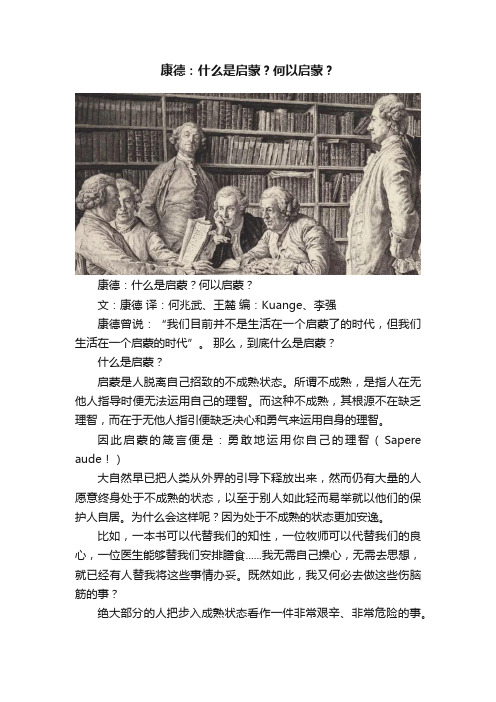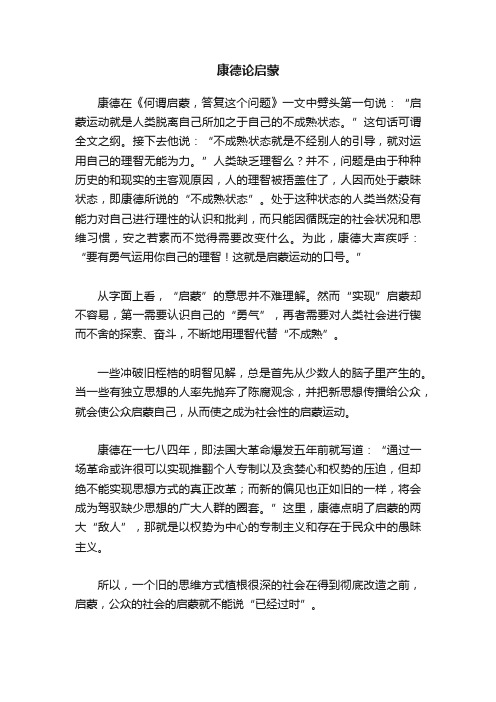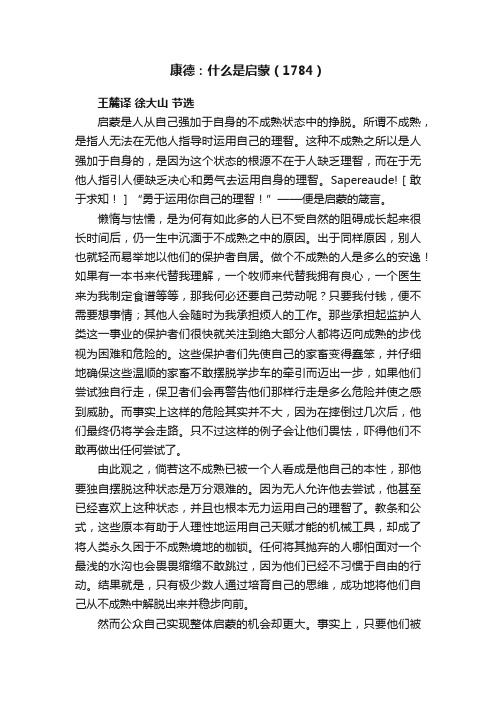【康德】什么是启蒙
康德 何谓启蒙(中文版,何兆武译本)

康德:何谓启蒙(何兆武译)康德:何谓启蒙(何兆武译)“在一切事情上都有公开运用自己理性的自由”启蒙运动就是人类脱离自己所加之于自己的不成熟状态,不成熟状态就是不经别人的引导,就对运用自己的理智无能为力。
当其原因不在于缺乏理智,而在于不经别人的引导就缺乏勇气与决心去加以运用时,那么这种不成熟状态就是自己所加之于自己的了。
Sapere aude! 要有勇气运用你自己的理智!这就是启蒙运动的口号。
懒惰和怯懦乃是何以有如此大量的人,当大自然早己把他们从外界的引导之下释放出来以后(naturaliter maiorennes)时,却仍然愿意终身处于不成熟状态之中,以及别人何以那么轻而易举地就俨然以他们的保护人自居的原因所在。
处于不成熟状态是那么安逸。
如果我有一部书能替我有理解,有一位牧师能替我有良心,有一位医生能替我规定食谱,等等;那么我自己就用不着操心了。
只要能对我合算,我就无需去思想:自有别人会替我去做这类伤脑筋的事。
绝大部分的人(其中包括全部的女性)都把步入成熟状态认为除了是非常之艰辛而外并且还是非常之危险的;这一点老早就被每一个一片好心在从事监护他们的保护人关注到了。
保护人首先是使他们的牲口愚蠢,并且小心提防着这些温驯的畜牲不要竟敢冒险从锁着他们的摇车里面迈出一步;然后就向他们指出他们企图单独行走时会威胁他们的那种危险。
可是这种危险实际上并不那么大,因为他们跌过几交之后就终于能学会走路的;然而只要有过一次这类事例,就会使人心惊胆战并且往往吓得完全不敢再去尝试了。
任何一个个人要从几乎已经成为自己天性的那种不成熟状态之中奋斗出来,都是很艰难的。
他甚至于已经爱好它了,并且确实暂时还不能运用他自己的理智,因为人们从来都不允许他去做这种尝试。
条例和公式这类他那天分的合理运用、或者不如说误用的机械产物,就是对终古长存的不成熟状态的一副脚梏。
谁要是抛开它,也就不过是在极狭窄的沟渠上做了一次不可靠的跳跃而己,因为他并不习惯于这类自由的运动。
康德对于启蒙的概念

康德对于启蒙的概念康德是德国哲学家、逻辑学家和政治理论家,他是西方哲学史上的重要人物之一,也是启蒙运动的重要代表之一。
在他的哲学思想中,启蒙是一个核心概念,它涉及到人类的独立思考、理性思考、自由探索、进步和发展以及自我完善等方面。
一、独立思考康德认为,启蒙首先意味着独立思考。
在康德看来,独立思考是人类理性的本质特征,是人类自由的基石。
只有通过独立思考,人们才能真正认识和理解世界,才能摆脱对权威和传统的盲目信仰和依赖。
因此,康德呼吁人们要勇于怀疑和挑战传统的观念和思维方式,要以自己的理性为依据,进行独立的思考和判断。
二、理性思考康德认为,理性是人类的本质特征之一,是人类区别于动物的关键所在。
在康德看来,理性不仅仅是一种思维能力,更是一种道德力量和政治力量。
通过理性思考,人们可以发现和认识真理,可以建立和维护公正的社会秩序。
因此,康德呼吁人们要用理性来审视世界和人类社会,要勇于挑战不合理的制度和观念,要以理性和公正为基础建立新的社会秩序。
三、自由探索康德认为,自由是人类的本质特征之一,是人类进步和发展的基础。
在康德看来,自由不仅仅是一种权利,更是一种责任和义务。
通过自由探索,人们可以发现新的知识和思想,可以创造新的文化和艺术。
因此,康德呼吁人们要勇于挑战旧有的文化和艺术形式,要以自由和创新为基础创造新的文化和艺术形式。
四、进步和发展康德认为,进步和发展是人类社会的本质特征之一。
在康德看来,进步和发展不仅仅是一种经济现象,更是一种道德现象和政治现象。
通过不断的进步和发展,人类社会可以不断向前推进,可以不断改善人类的生活质量和生存环境。
因此,康德呼吁人们要勇于追求进步和发展,要以理性和公正为基础推动社会的进步和发展。
五、自我完善康德认为,自我完善是人类个体发展的本质特征之一。
在康德看来,自我完善不仅仅是一种个人修养和道德追求,更是一种人生哲学和价值追求。
通过自我完善,人们可以不断提升自己的素质和能力,可以不断拓展自己的视野和思维方式。
康德:什么是启蒙

康德:什么是启蒙何谓启蒙?启蒙是人类从自我造成的不成熟状态中解脱出来。
不成熟是指缺少他人的教导就没有能力运用自己的理智。
这种不成熟状态之所以是自我造成的,其原因不在于缺少理智,而在于没有他人的教导就缺乏运用自己理智的决心和勇气。
Sapere Aude![要勇于认知] “要有勇气运用你自己的理智!” ——这就是启蒙运动的格言。
人类中之所以还有如此众多的人,即使自然早已将他们从疏离的外在教导中解脱出来(因自然方式而成熟),却依然心甘情愿地终身安处于不成熟状态之中,其原因就在于懒惰和怯懦,这也是为什么另一些人能够轻而易举地把自己标举为他们的监护者。
处于不成熟状态可真是轻松安逸。
如果我有一本书来充作我自己的见解、有一位牧师来充作我自己的良心、有一名医生来替我自己决定合理的食饮,等等等等诸如此类的,那我又何必要自己劳心费神,那完全没有必要了。
我无需思考,只需要有能力支付:其他人就会欣然应命帮我把那些伤脑筋的讨厌活儿全都包办了。
仁慈慷慨地担负起治理民众之任的监护者们小心翼翼地看护着,以确保民众中的绝大部分人(其中包括全部的女性)视通往成熟之路为畏途,充满了风险,更别说困难重重了。
在首先使他们驯养的牲口缄默无声之后,在确信这些温顺的生灵们即使被撤去拴缚在身上的络辔也不会再挪移一步之时,一旦它们试图想要独自迈步,监护者们就会向它们指出种种的威胁。
这危险现在看来实际上并没有那么严重,因为在跌倒几次之后,人最终一定能够学会自己走路;但诸如此类的示例却让人心生胆怯,通常就会把他们进一步尝试的所有企图全都吓退了。
因此,对于任何一个个体而言,要把自身从那种几乎已经变成他自己天性的不成熟状态中解脱出来是困难的。
他甚至已经开始喜欢上这种状态了,并且在这个时候,的的确确无力运用他自己的理智,因为从未有人允许他去作过这样的尝试。
条例和规程,这些基于他的自然禀赋的理性运用或更像是误用的机械刻板的工具,把他禁锢在永久的不成熟状态中。
康德:什么是启蒙?何以启蒙?

康德:什么是启蒙?何以启蒙?康德:什么是启蒙?何以启蒙?文:康德译:何兆武、王麓编:Kuange、李强康德曾说:“我们目前并不是生活在一个启蒙了的时代,但我们生活在一个启蒙的时代”。
那么,到底什么是启蒙?什么是启蒙?启蒙是人脱离自己招致的不成熟状态。
所谓不成熟,是指人在无他人指导时便无法运用自己的理智。
而这种不成熟,其根源不在缺乏理智,而在于无他人指引便缺乏决心和勇气来运用自身的理智。
因此启蒙的箴言便是:勇敢地运用你自己的理智(Sapere aude!)大自然早已把人类从外界的引导下释放出来,然而仍有大量的人愿意终身处于不成熟的状态,以至于别人如此轻而易举就以他们的保护人自居。
为什么会这样呢?因为处于不成熟的状态更加安逸。
比如,一本书可以代替我们的知性,一位牧师可以代替我们的良心,一位医生能够替我们安排膳食......我无需自己操心,无需去思想,就已经有人替我将这些事情办妥。
既然如此,我又何必去做这些伤脑筋的事?绝大部分的人把步入成熟状态看作一件非常艰辛、非常危险的事。
这一点早就被那些好心的保护人关注到了。
他们先是使家中饲养的小羊羔蠢笨,并小心翼翼地防着不让他们摆脱学步车的牵引而迈出一步,当他们尝试独自行走时,再告之以危险并使之感到威胁。
这种危险实际上并不是那么大,人类在跌过几次跤之后总能学会走路。
只不过曾经摔跤的例子会让他们畏怯,吓得他们不敢再做出任何尝试。
任何一个人要从不成熟的状态中奋斗出来,都非常艰难,因为那几乎已经成为他们天性的一部分。
保护者不允许他们走出,他们自己也爱上了不成熟的感觉。
抛弃不成熟状态后,人哪怕面对一个最浅的水沟也会畏畏缩缩不敢跳过,因为他们已经不习惯于自由的行动。
因此,真正通过自己精神的奋斗摆脱不成熟的状态,并且迈出切实步伐来的,真的只有极少数人。
即便如此,人类自己实现整体启蒙的机会很大。
只要他们得到自由,启蒙就不可避免。
即使以保护者自居的人当中也会存在几个独立思考者,他们在摆脱了不成熟的羁绊之后,将会理性认识人类自身的价值和每个人独立思考的光荣使命,并将这种精神传布开来。
康德什么是启蒙课件

康德认为,自由和理性是相互依存的,理性为自由提供了基础和保 障,自由则为理性指引了方向和目标。
康德对理性和自由的调和
理性和自由的冲突
01
康德认为,理性和自由在某种程度上是冲突的,因为理性强调
规则和必然性,而自由则强调无限可能性和任意性。
理性和自性和自由,使两者达到和谐统
THANKS
感谢观看
等、人权等价值观的追求。
启蒙激发了人们的理性和创造力 ,推动了科学、文化、艺术等各
个领域的发展。
启蒙对于个人成长和社会进步都 具有重要的意义和价值,它帮助 人们获得知识和理性,促进人类
文明的进步和发展。
03
康德对启蒙的看法
康德对理性的理解
理性是启蒙的核心
康德认为,理性是人类认 识世界和解决问题的基本 能力,也是启蒙的关键所 在。
。
促进人权意识
启蒙运动倡导人权、民主和法治 ,使人们更加关注个人权利和自 由,推动了民主化进程和社会进
步。
启蒙对现代社会的启示
1 2
倡导理性
启蒙运动强调理性和科学方法,使人们更加注重 客观事实和证据,推动了科学思维和理性决策的 普及。
追求自由
启蒙运动倡导自由和平等,使人们更加关注个人 权利和自由,推动了民主和自由的进程。
文化状况
启蒙运动在欧洲兴起,它 提倡理性、科学和人性的 思想,对当时的宗教和专 制统治构成了挑战。
康德的生活与思想
生活经历
康德生于1724年,逝世于1804年 ,他是德国哲学家、逻辑学家和 政治理论家,被视为现代哲学的 重要人物之一。
思想主张
康德主张理性、自由和民主,他批 判了传统的宗教和专制统治,提出 了“道德自律”和“目的论”等重 要哲学思想。
康德论启蒙

康德论启蒙康德在《何谓启蒙,答复这个问题》一文中劈头第一句说:“启蒙运动就是人类脱离自己所加之于自己的不成熟状态。
”这句话可谓全文之纲。
接下去他说:“不成熟状态就是不经别人的引导,就对运用自己的理智无能为力。
”人类缺乏理智么?并不,问题是由于种种历史的和现实的主客观原因,人的理智被捂盖住了,人因而处于蒙昧状态,即康德所说的“不成熟状态”。
处于这种状态的人类当然没有能力对自己进行理性的认识和批判,而只能因循既定的社会状况和思维习惯,安之若素而不觉得需要改变什么。
为此,康德大声疾呼:“要有勇气运用你自己的理智!这就是启蒙运动的口号。
”从字面上看,“启蒙”的意思并不难理解。
然而“实现”启蒙却不容易,第一需要认识自己的“勇气”,再者需要对人类社会进行锲而不舍的探索、奋斗,不断地用理智代替“不成熟”。
一些冲破旧桎梏的明智见解,总是首先从少数人的脑子里产生的。
当一些有独立思想的人率先抛弃了陈腐观念,并把新思想传播给公众,就会使公众启蒙自己,从而使之成为社会性的启蒙运动。
康德在一七八四年,即法国大革命爆发五年前就写道:“通过一场革命或许很可以实现推翻个人专制以及贪婪心和权势的压迫,但却绝不能实现思想方式的真正改革;而新的偏见也正如旧的一样,将会成为驾驭缺少思想的广大人群的圈套。
”这里,康德点明了启蒙的两大“敌人”,那就是以权势为中心的专制主义和存在于民众中的愚昧主义。
所以,一个旧的思维方式植根很深的社会在得到彻底改造之前,启蒙,公众的社会的启蒙就不能说“已经过时”。
启蒙的前提是“充分运用理性”的自由,这是康德论启蒙的一个基本点。
康德针对普鲁士官方的检查制度说,在普鲁士到处都是对自由的限制;要开启民智,就必须在一切事情上都有“公开运用”自己理性的自由。
他特别强调“公开运用”这几个字,每次提到时都加了着重点。
他反复讲这个道理:“必须永远有公开运用自己理性的自由,并且唯有它才能带来人类的启蒙。
”康德认为自由并非放任自流、我行我素,它体现了人类道德和人类幸福的一致性。
康德:什么是启蒙(1784)

康德:什么是启蒙(1784)王麓译徐大山节选启蒙是人从自己强加于自身的不成熟状态中的挣脱。
所谓不成熟,是指人无法在无他人指导时运用自己的理智。
这种不成熟之所以是人强加于自身的,是因为这个状态的根源不在于人缺乏理智,而在于无他人指引人便缺乏决心和勇气去运用自身的理智。
Sapereaude![敢于求知!]“勇于运用你自己的理智!”——便是启蒙的箴言。
懒惰与怯懦,是为何有如此多的人已不受自然的阻碍成长起来很长时间后,仍一生中沉湎于不成熟之中的原因。
出于同样原因,别人也就轻而易举地以他们的保护者自居。
做个不成熟的人是多么的安逸!如果有一本书来代替我理解,一个牧师来代替我拥有良心,一个医生来为我制定食谱等等,那我何必还要自己劳动呢?只要我付钱,便不需要想事情;其他人会随时为我承担烦人的工作。
那些承担起监护人类这一事业的保护者们很快就关注到绝大部分人都将迈向成熟的步伐视为困难和危险的。
这些保护者们先使自己的家畜变得蠢笨,并仔细地确保这些温顺的家畜不敢摆脱学步车的牵引而迈出一步,如果他们尝试独自行走,保卫者们会再警告他们那样行走是多么危险并使之感到威胁。
而事实上这样的危险其实并不大,因为在摔倒过几次后,他们最终仍将学会走路。
只不过这样的例子会让他们畏怯,吓得他们不敢再做出任何尝试了。
由此观之,倘若这不成熟已被一个人看成是他自己的本性,那他要独自摆脱这种状态是万分艰难的。
因为无人允许他去尝试,他甚至已经喜欢上这种状态,并且也根本无力运用自己的理智了。
教条和公式,这些原本有助于人理性地运用自己天赋才能的机械工具,却成了将人类永久困于不成熟境地的枷锁。
任何将其抛弃的人哪怕面对一个最浅的水沟也会畏畏缩缩不敢跳过,因为他们已经不习惯于自由的行动。
结果就是,只有极少数人通过培育自己的思维,成功地将他们自己从不成熟中解脱出来并稳步向前。
然而公众自己实现整体启蒙的机会却更大。
事实上,只要他们被获准自由,启蒙就几乎是不可避免的。
康德对于启蒙的定义

康德对于启蒙的定义
《康德对于启蒙的定义》
嘿,咱今儿来聊聊康德对于启蒙的定义哈。
就说有一天我去逛街,走着走着看到一家书店,我就溜达进去了。
在里面逛着逛着,突然看到一本关于康德的书。
我当时就好奇呀,这康德到底说了啥呢?然后我就拿起那本书翻了翻,嘿,就看到了他对于启蒙的定义。
康德说启蒙就是人从他自己造成的不成熟状态中挣脱出来。
哎呀,这话一开始我还不太懂呢。
我就一边继续在书店里逛,一边琢磨。
然后我看到一个小朋友在那认真地看书,他那种专注的样子让我好像有点明白了。
这小朋友不就是在努力摆脱自己可能有的无知,去探索知识嘛,这不就是一种挣脱不成熟的表现嘛。
再想想我们自己,很多时候我们可能因为各种各样的原因,不敢去尝试新东西,不敢去表达自己的想法,这不就是还处在一种不成熟的状态嘛。
而启蒙呢,就是让我们有勇气去打破这些束缚,去真正地成长。
就像我在书店里,从一开始对康德的启蒙定义不太理解,到后来通过观察和思考有点明白了,这也是我自己的一个小启蒙呀。
所以呀,我觉得康德对于启蒙的定义还真挺有意思的,让我们知道要不断地去突破自己,去变得更成熟,更有智慧呢!
咋样,我这么一说,是不是对康德的启蒙定义有点感觉啦?哈哈!。
- 1、下载文档前请自行甄别文档内容的完整性,平台不提供额外的编辑、内容补充、找答案等附加服务。
- 2、"仅部分预览"的文档,不可在线预览部分如存在完整性等问题,可反馈申请退款(可完整预览的文档不适用该条件!)。
- 3、如文档侵犯您的权益,请联系客服反馈,我们会尽快为您处理(人工客服工作时间:9:00-18:30)。
An Answer to the Question: "What is Enlightenment?"Written by Immanuel KantNarrated by Michael ScottProduced by Konigsberg in Prussia, 30th September, 1784Enlightenment is man's release from his self-incurred tutelage. Tutelage is man's inability to make use of his understanding without direction from another. Self-incurred is this tutelage when its cause lies not in lack of reason but in lack of resolution and courage to use it without direction from another. Sapere aude! "Have courage to use your own reason!" - that is the motto of enlightenment. Laziness and cowardice are the reasons why so great a portion of mankind, after nature has long since discharged them from external direction (naturaliter maiorennes), nevertheless remains under lifelong tutelage, and why it is so easy for others to set themselves up as their guardians. It is so easy not to be of age. If I have a book which understands for me, a pastor who has a conscience for me, a physician who decides my diet, and so forth, I need not trouble myself. I need not think, if I can only pay - others will easily undertake the irksome work for me.That the step to competence is held to be very dangerous by the far greater portion of mankind (and by the entire fair sex) - quite apart from its being arduous is seen to by those guardians who have so kindly assumed superintendence over them.After the guardians have first made their domestic cattle dumb and have made sure that these placid creatures will not dare take a single step without the harness of the cart to which they are tethered, the guardians then show them the danger which threatens if they try to go alone. Actually, however, this danger is not so great, for by falling a few times they would finally learn to walk alone. But an example of this failure makes them timid and ordinarily frightens them away from all further trials.For any single individual to work himself out of the life under tutelage which has become almost his nature is very difficult. He has come to be fond of his state, and he is for the present really incapable of making use of his reason, for no one has ever let him try it out. Statutes and formulas, those mechanical tools of the rational employment or rather misemployment of his natural gifts, are the fetters of an everlasting tutelage. Whoever throws them off makes only an uncertain leap over the narrowest ditch because he is not accustomed to that kind of free motion. Therefore, there are few who have succeeded bytheir own exercise of mind both in freeing themselves from incompetence and in achieving a steady pace.But that the public should enlighten itself is more possible; indeed, if only freedom is granted enlightenment is almost sure to follow. For there will always be some independent thinkers, even among the established guardians of the great masses, who, after throwing off the yoke of tutelage from their own shoulders, will disseminate the spirit of the rational appreciation of both their own worth and every man's vocation for thinking for himself.But be it noted that the public, which has first been brought under this yoke by their guardians, forces the guardians themselves to remain bound when it is incited to do so by some of the guardians who are themselves capableof some enlightenment - so harmful is it to implant prejudices, for they later take vengeance on their cultivators or on their descendants. Thus the public can only slowly attain enlightenment. Perhaps a fall of personal despotism or of avaricious or tyrannical oppression may be accomplished by revolution, but never a true reform in ways of thinking. Farther, new prejudices will serve as well as old ones to harness the great unthinking masses.For this enlightenment, however, nothing is required but freedom, and indeed the most harmless among all the things to which this term can properly be applied. It is the freedom to make public use of one's reason at every point. But I hear on all sides, "Do not argue!" The Officer says: "Do not argue but drill!" The tax collector: "Do not argue but pay!" The cleric: "Do not argue but believe!" Only one prince in the world says, "Argue as much as you will, and about what you will, but obey!" Everywhere there is restriction on freedom.Which restriction is an obstacle to enlightenment, and which is not an obstacle but a promoter of it? I answer: The public use of one's reason must always be free, and it alone can bring about enlightenment among men. The private use of reason, on the other hand, may often be very narrowly restricted without particularly hindering the progress of enlightenment. By the public use of one's reason I understand the use which a person makes of it as a scholar before the reading public.Private use I call that which one may make of it in a particular civil post or office which is entrusted to him. Many affairs which are conducted in the interest of the community require a certain mechanism through which some members of the community must passively conduct themselves with an artificial unanimity, so that the government may direct them to public ends, or at least prevent them from destroying those ends. Here argument is certainly not allowed - one must obey. But so far as a part of the mechanism regards himself at the same time as a member of the whole community or of a society of world citizens, and thus in the role of a scholar who addresses the public (in the proper sense of the word) through his writings, he certainly can argue without hurting the affairs for which he is in part responsible as a passive member. Thus it would be ruinous for an officer in service to debate about the suitability or utility of a command given to him by his superior; he must obey. But the right to make remarks on errors in the military service and to lay them before the public for judgment cannot equitably be refused him as a scholar. The citizen cannot refuse to pay the taxes imposed on him; indeed, an impudent complaint at those levied on him can be punished as a scandal (as it could occasion general refractoriness). But the same person nevertheless does not act contrary to his duty as a citizen, when, as a scholar, he publicly expresses his thoughts on the inappropriateness or even the injustices of these levies, Similarly a clergyman is obligated to make his sermon tohis pupils in catechism and his congregation conform to the symbol of the church which he serves, for he has been accepted on this condition.But as a scholar he has complete freedom, even the calling, to communicate to the public all his carefully tested and well meaning thoughts on that which is erroneous in the symbol and to make suggestions for the better organization of the religious body and church. In doing this there is nothing that could be laid as a burden on his conscience. For what he teaches as a consequence of his office as a representative of the church, this he considers something about which he has not freedom to teach according to his own lights; it is something which he is appointed to propound at the dictation of and in the name of another. He will say, "Our church teaches this or that; those are the proofs which it adduces." He thus extracts all practical uses for his congregation from statutes to which he himself would not subscribe with full conviction but to the enunciation of which he can very well pledge himself because it is not impossible that truth lies hidden in them, and, in any case, there is at least nothing in them contradictory to inner religion. For if he believed he had found such in them, he could not conscientiously discharge the duties of his office; he would have to give it up. The use, therefore, which an appointed teacher makes of his reason before his congregation is merely private, because this congregation is only a domestic one (even if it be a large gathering); with respect to it, as a priest, he is not free, nor can he be free, because he carries out the orders of another. But as a scholar, whose writings speakto his public, the world, the clergyman in the public useof his reason enjoys an unlimited freedom to use his own reason to speak in his own person.That the guardian of the people (in spiritual things) should themselves be incompetent is an absurdity which amounts to the eternalization of absurdities.But would not a society of clergymen, perhaps a church conference or a venerable classis (as they call themselves among the Dutch), be justified in obligating itself by oath to a certain unchangeable symbol in order to enjoy an unceasing guardianship over each of its numbers and thereby over the people as a whole, and even to make it eternal? I answer that this is altogether impossible. Such contract, made to shut off all further enlightenment from the human race, is absolutely null and void even if confirmed by the supreme power, by parliaments, and by the most ceremonious of peace treaties. An age cannot bind itself and ordain to put the succeeding one into such a condition that it cannot extend its (at best very occasional) knowledge, purifyitself of errors, and progress in general enlightenment. That would be a crime against human nature, the proper destination of which lies precisely in this progress and the descendants would be fully justified in rejecting those decrees as having been made in an unwarranted and malicious manner.The touchstone of everything that can be concluded as a law for a people lies in the question whether the people could have imposed such a law on itself. Now such religious compact might be possible for a short and definitelylimited time, as it were, in expectation of a better. One might let every citizen, and especially the clergyman, in the role of scholar, make his comments freely and publicly, i.e. through writing, on the erroneous aspects of the present institution.The newly introduced order might last until insight into the nature of these things had become so general and widely approved that through uniting their voices (even if not unanimously) they could bring a proposal to the throne to take those congregations under protection which had united into a changed religious organization according to their better ideas, without, however hindering others who wish to remain in the order. But to unite in a permanent religious institution which is not to be subject to doubt before the public even in the lifetime of one man, and thereby to make a period of time fruitless in the progress of mankind toward improvement, thus working to the disadvantage of posterity - that is absolutely forbidden. For himself (and only for a short time) a man may postpone enlightenment in what he ought to know, but to renounce it for posterity is to injure and trample on the rights of mankind. And what a people may not decree for itself can even less be decreed for them by a monarch, for his lawgiving authority rests on his uniting the general public will in his own. If he only sees to it that all true or alleged improvement stands together with civil order, he can leave it to his subjects to do what they find necessary for their spiritual welfare. This is not his concern, though it is incumbent on him to prevent one of them from violently hindering another in determining and promoting this welfare to the best of his ability. To meddle in these matters lowers his own majesty, since by the writings in which his own subjects seek to present their views he may evaluate his own governance. He can do this when, with deepest understanding, he lays upon himself the reproach, Caesar non est supra grammaticos.Far more does he injure his own majesty when he degradeshis supreme power by supporting the ecclesiastical despotism of some tyrants in his state over his other subjects.If we are asked, "Do we now live in an enlightened age?" the answer is, "No," but we do live in an age of enlightenment. As things now stand, much is lacking which prevents men from being, or easily becoming, capable of correctly using their own reason in religious matters with assurance and free from outside direction. But on the other hand, we have clear indications that the field has now been opened wherein men may freely dea1 with these things and that the obstacles to general enlightenment or the release from self-imposed tutelage are gradually being reduced. In this respect, this is the age of enlightenment, or the century of Frederick.A prince who does not find it unworthy of himself to say that he holds it to be his duty to prescribe nothing to men in religious matters but to give them complete freedomwhile renouncing the haughty name of tolerance, is himself enlightened and deserves to be esteemed by the grateful world and posterity as the first, at least from the side of government, who divested the human race of its tutelage and left each man free to make use of his reason in matters of conscience. Under him venerable ecclesiastics are allowed, in the role of scholar, and without infringing on their official duties, freely to submit for public testing their judgments and views which here and there diverge from the established symbol. And an even greater freedom is enjoyed by those who are restricted by no official duties.This spirit of freedom spreads beyond this land, even to those in which it must struggle with external obstacles erected by a government which misunderstands its own interest. For an example gives evidence to such a government that in freedom there is not the least cause for concern about public peace and the stability of the community. Men work themselves gradually out of barbarityif only intentional artifices are not made to hold them in it.I have placed the main point of enlightenment - the escape of men from their self-incurred tutelage - chiefly in matters of religion because our rulers have no interest in playing guardian with respect to the arts and sciences and also because religious incompetence is not only the most harmful but also the most degrading of all. But the manner of thinking of the head of a state who favors religious enlightenment goes further, and he sees that there is no danger to his lawgiving in allowing his subjects to make public use of their reason and to publish their thoughts on a better formulation of his legislation and even theiropen-minded criticisms of the laws already made. Of this we have a shining example wherein no monarch is superior to him we honor.But only one who is himself enlightened, is not afraid of shadows, and has a numerous and well-disciplined army to assure public peace, can say: "Argue as much as you will, and about what you will, only obey!" A republic could not dare say such a thing. Here is shown a strange and unexpected trend in human affairs in which almost everything, looked at in the large, is paradoxical.A greater degree of civil freedom appears advantageous to the freedom of mind of the people, and yet it places inescapable limitations upon it. A lower degree of civil freedom, on the contrary, provides the mind with room for each man to extend himself to his full capacity. As nature has uncovered from under this hard shell the seed for which she most tenderly cares - the propensity and vocation to free thinking - this gradually works back upon thecharacter of the people, who thereby gradually become capable of managing freedom; finally, it affects the principles of government, which finds it to its advantageto treat men, who are now more than machines, in accordance with their dignity.Retrieved from"/wiki/What_is_Enlightenment%3F"。
